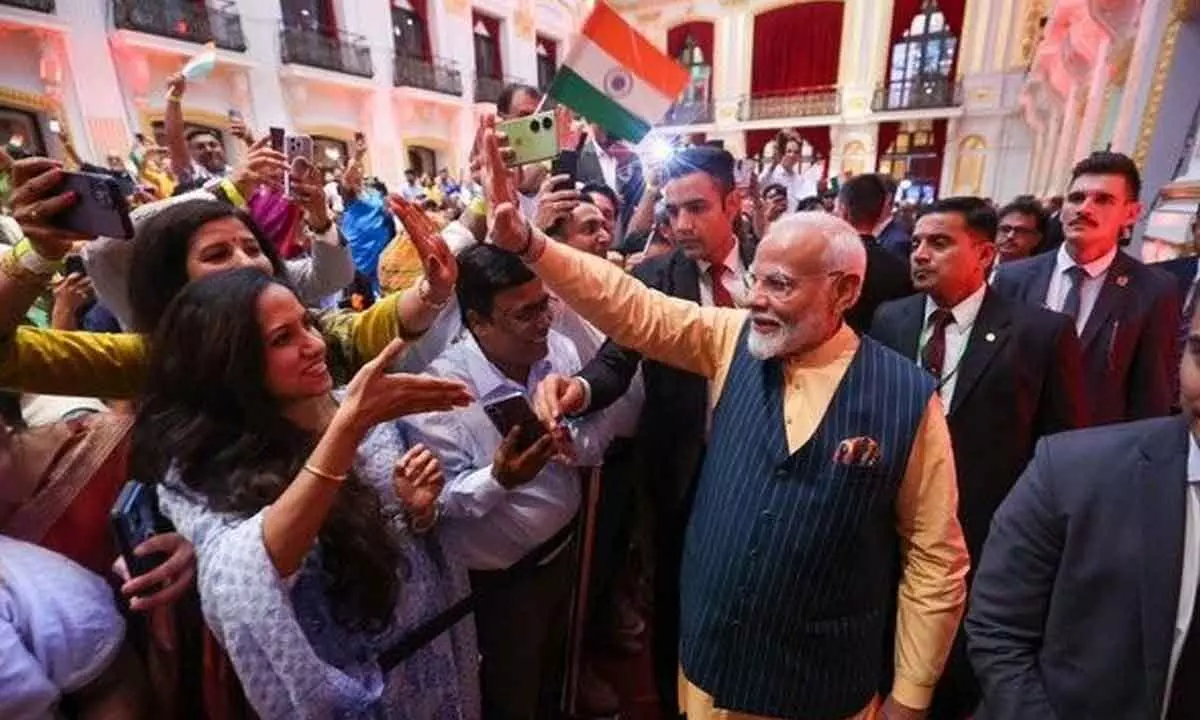Live
- They always want me to win, and now I feel lucky to have been offered a story like ‘Zebra’: Satyadev Kancharana
- ‘Democracy first, humanity first’: PM Modi in Guyana's parliament on two countries' similarities
- PKL Season 11: Telugu Titans register third straight win to top standings
- Is Pollution Contributing to Your COPD?
- NASA Unveils Underwater Robots for Exploring Jupiter's Moons
- Additional Central forces arrive in violence-hit Manipur
- AR Rahman and Saira Banu’s Divorce: Legal Insights into Common Issues in Bollywood Marriages
- 82.7 pc work completed in HPCL Rajasthan Refinery area: official
- Curfew relaxation extended in 5 Manipur districts on Friday
- Tab scam prompts Bengal govt to adopt caution over fund disbursement
Just In

Both countries agreed to significantly upgrade their bilateral partnership to a higher level. They will adopt a strategic approach to advance this shared objective. To this end, in addition to closer political-level dialogue, they emphasised on a future-oriented bilateral sustainable economic and technology partnership, covering a range of new initiatives and joint projects, collaborative technology development, research and innovation and business-to-business engagement inter alia in green and digital technologies, infrastructure, renewable energy, water management, life sciences, smart cities, mobility and transportation
At the invitation of Chancellor Karl Nehammer, Prime Minister Narendra Modi paid an official visit to Austria from 9-10 July 2024. During his visit, the Prime Minister called on H.E. Alexander Van der Bellen, President of Austria, and held bilateral discussions with Chancellor Nehammer. This was the Prime Minister’s first visit to Austria and that of an Indian Prime Minister after 41 years. This year marks the 75th year of diplomatic relations between the two countries.
The Prime Minister and the Chancellor emphasised that the shared values of democracy, freedom, international peace and security, a rules-based international order with the UN Charter at its core, the shared historical linkages, and the long-standing ties between the two countries are at the centre of the growing enhanced partnership. They reiterated their commitment to continue their efforts towards deepening and widening bilateral, regional and international cooperation for a more stable, prosperous and sustainable world.
Chancellor Nehammer and Prime Minister Modi recognised that the two countries have the potential to significantly upgrade their bilateral partnership to a higher level. They agreed to adopt a strategic approach to advance this shared objective. To this end, in addition to closer political-level dialogue, they emphasised on a future-oriented bilateral sustainable economic and technology partnership, covering a range of new initiatives and joint projects, collaborative technology development, research and innovation and business-to-business engagement inter alia in green and digital technologies, infrastructure, renewable energy, water management, life sciences, smart cities, mobility and transportation.
Political & security cooperation
Both leaders reinforced their commitment to a free, open and rules-based Indo-Pacific in accordance with the international law of the sea as reflected in UNCLOS and with full respect for the sovereignty, territorial integrity and freedom of navigation to the benefit of maritime security and international peace and stability.
The two leaders exchanged in-depth assessments of recent developments in Europe as well as West Asia/Middle East. They noted the complementarities in the approaches of the two countries that prioritise efforts towards restoring peace and avoiding armed conflict as well as rigorous adherence to international law and the UN Charter.
Concerning the war in Ukraine, both leaders supported any collective effort to facilitate a peaceful resolution consistent with international law and the UN Charter.
Both sides also called for concerted action against all terrorists, including through designations or individuals affiliated with groups that are listed by the UN Security Council 1267 Sanctions Committee. Both countries reiterated their commitment to work together in FATF, NMFT and other multilateral platforms.
The two leaders recalled the launch of the India-Middle East-Europe Corridor (IMEC) on the margins of the G20 summit in Delhi in September 2023. Nehammer conveyed Austria’s keen interest to engage with IMEC and pointed to Austria’s location at the centre of Europe as a key enabler of connectivity.
Economic ties
The leaders welcomed initiatives to link the innovation and start-up ecosystems of the two countries through the Start-Up Bridge set up during the visit of the Austrian Minister of Labour and Economy to India in February 2024 and the successful visit of a group of Indian Start-Ups to Austria in June 2024. They encouraged relevant agencies of both countries to work to deepen further similar exchanges in future, including through frameworks such as Austria’s Global Incubator Network and the Start Up India initiative.
Being parties to the United Nations Framework Convention on Climate Change (UNFCCC) and as countries committed to holding the increase in the global average temperature to well below 2 degrees Celsius above pre-industrial levels, the leaders recognised that this would significantly reduce the risks and impacts of climate change. They recalled the binding targets adopted at the EU level for climate neutrality by 2050, the Austrian government’s commitment to achieve climate neutrality by 2040, and the Indian government’s commitment to achieving net zero emissions by 2070.
Chancellor Nehammer and Modi They encouraged academic institutions of both countries to build future-oriented partnerships focused on areas of mutual interest, especially in science, technology, and engineering.
The leaders also noted the growing interest among Austrians in yoga and Ayurveda. They welcomed efforts to promote further bilateral cultural ties in music, dance, opera, theatre, films, literature, sports and other fields, including in the framework of the recently signed MOU on Cultural Cooperation. They encouraged efforts by relevant agencies to work together to expand tourist flows in both directions, including by expanding direct flight connectivity, the lengths of stay and other initiatives. (PIB)

© 2024 Hyderabad Media House Limited/The Hans India. All rights reserved. Powered by hocalwire.com







